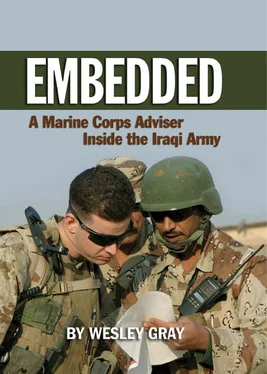My thoughts on helping the Iraqis solve their supply problems had changed by the end of our thirty-minute convoy. At the end of our trip the jundi started throwing boxes of their meals, ready-to-eat (MREs) onto the side of the road. I could not believe it. How could they bitch to me about not having supplies then throw boxes of chow off their Humvee because it did not appeal to their taste buds? We had just risked our lives in the Barwana markets buying these guys food and now they were throwing away their backup chow? This episode only reinforced what I had seen earlier when we were unloading all the new Iraqi supplies. The Iraqis showed me their bin of used equipment. The bin was filled with used flak jackets, boots, and uniforms from soldiers who had quit or been fired. If these guys were so desperate, why didn’t they use some of this stuff? It was not in poor shape. What’s wrong with these people? I thought.
I think the answer lies in the Iraqi perception that American taxpayers have an infinite supply of money. Guess what, Mr. Jundi ? The Marines recycle gear all the time and never throw out boxes of MREs needlessly. At times the Iraqis annoyed me with their sob stories, especially when their whining was followed by a bout of wastefulness and an attitude that Americans “will just buy us new things, as they always do.” But then again—MREs do suck!
Chapter 10
Insights on Iraqi Culture
September 2006
Every day I was in Iraq I learned more about Iraqi culture. The most shocking lesson came from Colonel Abass, who gave Lieutenant Colonel Cooling (the 3/3 commander), a few U.S. Army Special Forces soldiers, Staff Sergeant Haislip, and I a lesson on Arab marital relations at a lunch gathering.
A Dinner Date with Colonel Abass
After the standard thirty minutes of chit-chat over lunch, Cooling said to Abass, “Seyidi [Sir], what do you think about the insurgents in this area?” Abass responded through Martin, the terp, “My honest opinion is they are all faggots and homosexuals and do not follow the Koran. They probably don’t even beat their wives.” We all chuckled at the statement, but we could not believe what we were hearing.
Cooling asked Abass the same question we all wanted to ask: “So you said the insurgents do not beat their wives—is not beating your wife considered a bad thing?” Abass got out of his seat with a wide grin on his face and spoke, “In Iraq, it is mandatory you beat your wife!” We all looked at each other, puzzled but curious to see where this conversation was going. He continued, “To not beat your wife is considered unmanly. Men who do not beat their women allow their women to take advantage of them through their powers of seduction. I think Western pressure to stop wife beating will only lead to a systematic weakness in Iraqi men.”
Cooling asked, “Now, Seyidi, what if your wife is not causing any problems? Would you still beat her?” Abass replied, “Gentlemen, that is a good question. Let me explain. It is important to beat your wife to remind her you are in control. For example, I have two wives. One of my wives is a disaster and I beat her all the time; however, one of my wives is absolutely perfectly behaved, yet despite her good behavior, I still must beat her.”
We all listened intently, trying to decipher the absurdity of this statement. Abass continued, “It is not like I just start beating my good wife for any reason—that is senseless. I make sure she knows why I am beating her.” He paused to collect his thoughts. “One trick I have used in the past has worked quite well. Let me tell you the story. I had just returned from the doctor’s office and the doctor told me that I had very high cholesterol and that I must cease my intake of sodium. I told my wife this bit of news and she responded by ensuring that all of my food was prepared without any salt. Everything was fine for a few weeks. Even so, one evening I knew I needed to beat my wife.”
I halted the conversation. “Seyidi, you felt a need to beat your wife?” Abass replied, “Yes, of course—but let me continue with the story. So my wife brought me a bowl of soup without any salt, just like she was supposed to do. When she looked away, I sprinkled salt on my soup. I ate the soup and after a few bites, I started yelling at her for trying to kill me. She was a bit surprised there was salt in the soup, but assumed she had made the mistake. I proceeded to beat her as punishment and she accepted the beating.”
We sat around the table and watched the Iraqi officers in attendance nod in agreement with Abass’s story. This story made perfect sense to them. In contrast none of us could believe what we were hearing. Colonel Abass, aware of our concern, announced, “I understand this must sound cruel to you, but it is just how we operate in Iraq. It is part of our culture and is accepted as the proper way of doing business.”
Cooling followed up with a question. “Seyidi, I understand this is your culture and I want to understand it; however, what if some man pulled these same tricks on your sister or mother? Wouldn’t that offend you?” Abass chuckled and rolled his eyes at the lieutenant colonel. “Let me tell you a story about my sister,” he said. “She came to me one day trying to address the issue of her husband beating her. She thought that I would be able to stop it and help her situation. She asked me to talk to her husband so he would stop beating her.” He paused. “You know what I asked her?” We all had blank stares on our faces. Abass continued, “I asked her why she was getting beaten. She told me she had been complaining a lot because of disagreements she had with her husband and she was refusing to do some of the things he was telling her to do.” Captain Pitts, the Special Forces team leader, inquired, “Did you kick the husband’s ass?” Abass, taken aback, responded, “No, of course not. Instead, I beat my sister on the spot and then told her husband that I was sorry she was being disrespectful to him and that if there were any problems he could contact me.”
Colonel Abass’s solution was a double whammy for his sister. We were all in disbelief at what we had heard. And yet the Iraqis were all nodding in agreement. In this part of the world, I figured, that’s just how things work. It is a man’s world over here. Or in Colonel Abass’s words, “The only time a woman is allowed on top in Iraq is in the bedroom.”
After hearing Abass’s thoughts on the theory of wife beating, we moved on to another topic of interest: Iraqi infantry tactics. “Seyidi,” I asked, “I have another question for you. Can you explain why Iraqi soldiers shoot all of the ammunition in their magazines in the general direction of insurgents when we take fire? It seems like a waste.” All the Americans in the room waited for the explanation to one of the biggest puzzles in Iraq.
Colonel Abass responded, “Jamal, I know this behavior perplexes Marines. They say my soldiers are undisciplined or cowards. Here is the difference, though. Marines have all kinds of fancy scopes on their weapons, more accurate weapons, and much more marksmanship training. Of course they are going to sit back and take well-aimed shots.” Abass paused before continuing. “Here is some advice for the Marines. As opposed to telling me my soldiers are cowards and undisciplined with their fire, Marines should be giving me money to ensure my jundi keep fighting the way they do.”
We all wondered what the colonel meant by this. Abass explained, “You remember a few days ago when the Marines shot an insurgent a couple of times, but he didn’t die? The Marines ended up evacuating the insurgent to Al Asad for medical care. This is a waste. If my jundi were out there, I can assure you the insurgent would have had thirty or forty bullet holes in his body and wouldn’t have lived.”
Читать дальше












